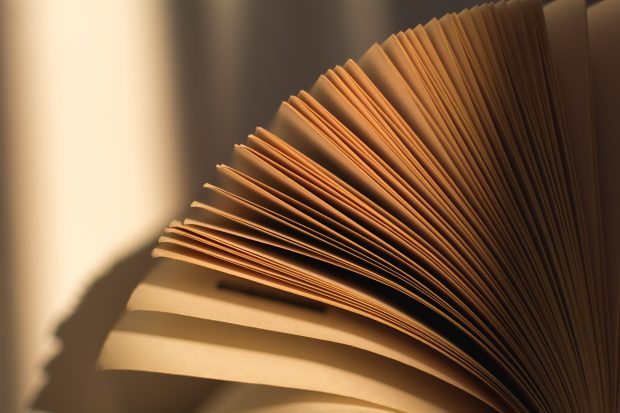City-run used bookshop offers to keep alive things from bygone days
Lee Ji-yeon gasped with surprise as she grabbed a worn-out book from a row of similar tomes neatly arranged on a stand at a used bookstore on a recent afternoon. “It’s the history textbook from back in my day. Korean History was one of the few classes I actually paid attention to. I can spot that book’s cover in an instant,” the 41-year-old resident of Seoul’s southeastern Songpa district chuckled in the middle of a long, grandiosely built iron tunnel of bookshelves. Lee was among a number of visitors to the Seoul Book Repository, South Korea’s first public secondhand bookstore, which was transformed by the Seoul city government from an old warehouse as part of a city revitalization project.
Opened in March, the bookstore is a far cry from ordinary used bookshops, commonly associated with dusty and run-down images. Thirty-two sturdy bookshelves are lined up on either side of the 1,465 square-meter single-floor building, with its meandering arched walkway burrowing through the middle in the shape of an actual “bookworm.” At the entrance, automatic sliding doors make mothers with baby strollers happy. Students sit in groups on the clean and shiny ground, chit-chatting in half whispers, as if they are in a library. But its elaborate and modern interior is only a small part of what defines this new place.
The establishment of the public secondhand bookstore was part of the city government’s efforts to prop up struggling small, independent secondhand book vendors and retain the existence and values of the traditional used book market by helping them keep afloat. The revenue of secondhand bookstores in South Korea totaled 333.4 billion won (US$294.1 million) in 2016, the Publication Industry Promotion Agency of Korea showed in a 2017 report. Of the figure, small shops accounted for less than 10 percent. Big corporate players, like Aladin and Yes24, dominate the market. The bookshops that have signed consignment contracts with the city government are mostly from a street along the Cheonggye Stream in central Seoul, the now run-down mecca of second-hand books.
The street was most prosperous in the 1960s-70s with over 100 used bookshops bustling with needy young college students who came seeking to buy books more cheaply. Now there are fewer than 20 of them left, most of which are barely making a profit. “The Seoul Book Repository is not just a secondhand bookshop. It seeks, as a platform, to connect people who look for unique cultural space and shops that are at risk,” Lee Jeong-su, director of the Seoul Metropolitan Library, told a press conference earlier. The bookstore has attracted over 30,000 visitors only three weeks into its start. Also notable are some 120,000 books stored at the shop. They are sorted out on the shelves, not by the usual alphabetical order — in this case by the sequence of the Korean letters — but according to the name of 25 vendors that have agreed to sell their books there.
On every shelf hangs a tiny tin case with the name of the member store on it. Inside the case are the shop’s business cards that visitors can take with them. The collection of rare items on public exhibit amounts to about 10,000 articles, including worn-out textbooks, like the one Lee from Songpa spotted, and those dating further back to as early as the post-Korean War period of the mid-1950s. The very first editions of poetry, popular teen cartoons from the 1980s-90s, and the last copies of novels that are out of print, add to the flavor of nostalgia. “We would like the rare publications to bring back wonderful memories about used books and a reminder that they are a valuable asset worth possessing,” Lee, the director of the city library, added.
The old items that come with the highest price tags are the entire published collection of the Sunday Seoul, a now-defunct adult entertainment weekly that once led the publishing industry from the late 1960s and the early 1990s. They are packaged in five boxes and the Green Books is selling them for 150 million won, according to Seoul city. “It’s a blast from the past to see the Sunday Seoul,” Park Jae-sik, a retiree from Sadang in southern Seoul, said as he flipped through one copy. “I was young back then. Just looking at them somehow takes me back to those days.” Skeptics raised doubts over whether the publicly-funded secondhand bookstore will help revive the market that has already been on a downtrend. The city’s active push and undivided support from the vendors have offset such concerns. “With the public reception being more than positive, the question is now, how we are going to make it go on in a way that it will keep attracting the public and boosting the shops’ profitability,” Baek Won-keun, head of Seoul-based Book and Society Research Institute, said. Baek added that maintaining demand from the younger generations and highlighting the place as a cultural inspiration will be key to its survival. But at the end of the day, it all boils down to the “good old stuff.” “I hope to see more things of the past, like a museum,” Lee from the Songpa district said. “It would really be a repository then, literally and figuratively speaking, wouldn’t it?”
By Kim Seung-yeon
(Yonhap)

























































